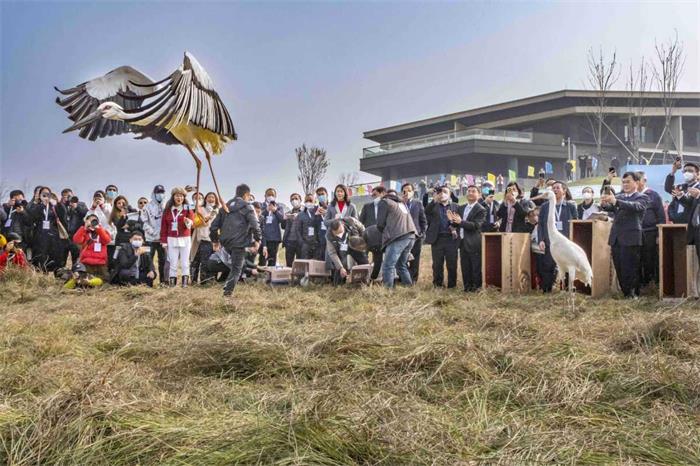Nation's modernization to follow harmonious path
While simultaneously meeting people's growing needs for a better life and a beautiful environment, the Chinese path to modernization also offers other countries a new, alternative path to prosperity.
Qian Yong, director of the Research Center for Xi Jinping Thought on Ecological Civilization, made the remarks in an interview with China Daily after President Xi Jinping stressed "harmony between humanity and nature" as a major feature of China's modernization at the 20th National Congress of the Communist Party of China.

Injured migratory birds that were rescued by animal protectionists are released into the wild on Saturday as part of a bird-watching event in Jiujiang, Jiangxi province.
China's modernization features a huge population, common prosperity for all, material and cultural-ethical advancement, harmony between humanity and nature, and peaceful development, Xi, who is also general secretary of the CPC Central Committee, said at the opening session of the congress, which ran from Oct 16 to 22.
"Respecting, adapting to and protecting nature is essential for building China into a modern socialist country in all respects," Xi said. "We must remember to maintain harmony between humanity and nature when planning our development."
Qian said that under the guidance of Xi Jinping Thought on Ecological Civilization, China has rolled out a series of measures to forge modernization featuring harmony between humanity and nature. Xi's statement at the congress has pointed the way and provided fundamental guidance "for the country's endeavor to build a Beautiful China", he added.
"Unswervingly adhering to the new development philosophy, China has resolutely avoided seeking economic growth at the expense of the environment, and promoted transformation and upgrading of the country's industrial structure and energy mix," Qian said.
By mapping red lines for environmental protection, developing standards for environmental quality and setting ceilings on resource utilization, the country is striving to boost economic and social development based on highly efficient utilization of its resources and green and low-carbon growth, he said.
According to the Ministry of Ecology and Environment, China has on average over the past 10 years managed to support annual economic growth of 6.6 percent, with a yearly increase of 3 percent in energy consumption.
Institutional guarantees for the construction of an ecological civilization have also been strengthened, Qian said. The country, for example, has rolled out high-profile central environmental inspection, which is headed by minister-level officials, to crack down on environmental violations. A "river chief system" that tasks heads of different levels of governments to coordinate river protection has also been established.
Over the past 10 years, China has enacted and amended over 30 laws and regulations that concern environmental protection, he added.
Qian said the Western path to modernization is not the right choice for China, not only because of the historical lessons learned from developed Western countries, but also the country's national conditions.
Noting that modernization is a concept shaped by Western developed nations, Qian said the Western model has seen nature plundered in the pursuit of profits.
"While creating massive material wealth, it has resulted in unimaginable damage to the environment," he said, citing major environmental disasters from the 1930s to the 1960s as examples.
In 1952, for instance, pollution and atmospheric conditions resulted in an incident known as the Great London Smog. Up to 4,000 people died as a direct result of the smog, according to government medical reports in the weeks following the event. Such incidents have sounded the alarm for humanity with extremely bitter prices to be paid, he said.
Qian said the carrying capacity of China's environment is limited and its ecosystems are fragile, however, with a population of over 1.4 billion, the nation has reversed the trend of environmental deterioration.
"The Western development mode of high-energy consumption and pollution is impractical if China wants to modernize the whole country," he said.
Qian also underscored the significance the Chinese modernization model has for the world.
The Chinese path has abandoned the Western development mode of "pollution first, and then treatment" and offers a new modernization path that properly handles the relationships between humanity and nature, and development and environmental protection, he said.
As China embarks on a new journey to build a modern socialist country in all respects, it will "contribute more Chinese wisdom, solutions and strength to the construction of a global ecological civilization and inject strong momentum into the endeavor of building a community with a shared future and a clean, beautiful world", Qian said.
